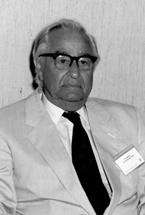
Born on December 6, 1920 in Stainford, Yorkshire, Porter studied at Leeds University and, from 1945, at Emmanuel College, Cambridge, where he worked as a postgraduate research student with Professor Ronald G. Norrish and was appointed deputy head of the Physical Chemistry Department in 1952. Norrish and Porter studied extremely fast reactions such as occur in the course of changes in hydrogen bridge structures or conformational changes of proteins, nucleic acids and polypeptides. They developed innovative measuring techniques based on the idea that chemical equilibria can be "upset" by short high-energy (optical, electric or acoustic) pulses. The subsequent return to equilibrium conditions - the "relaxation process" - can then either be recorded directly or, in the case of periodic deviations - measured in the form of phase relations.
Porter and Norrish succeeded in determining the velocity of reaction steps, particularly in the gaseous phase. At a later stage they were able to confine the disturbance to individual participants in the reaction, thereby obtaining a better understanding of the molecular events involved. From 1955, Porter was Professor of Physical Chemistry at Sheffield University. In 1966, he went to London to become Director and Fullerian Professor of Chemistry at the Royal Institution. From 1970 to 1972 he was President of the Royal Chemical Society, London. He attracted world-wide attention in 1973 with his visionary statement that our current energy problems could be solved by the use of solar energy, and that the actual problem could be reduced to developing an economically feasible solar technology. In 1967 Porter and Norrish shared one half of the Chemistry Nobel Prize for their investigations of extremely fast reactions, while the other half of the Prize went to Manfred Eigen, Göttingen.
Lord Porter passed away on 31 August 2002, at the age of 81.
